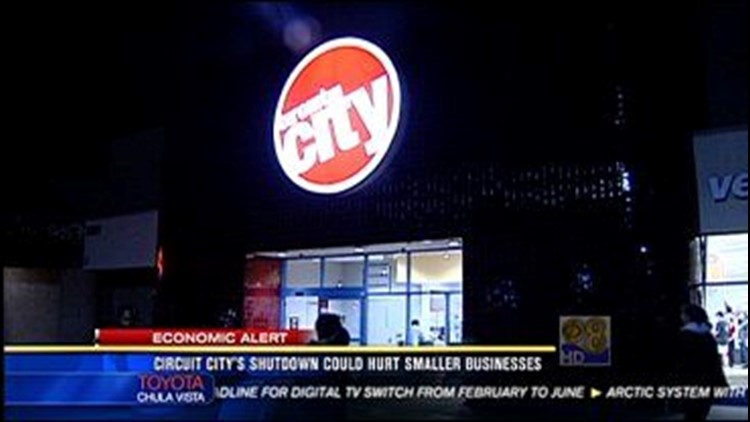The closure of the nation's second-biggest consumer electronics retailer spells more trouble for the nations malls, and is the latest casualty of an unprecedented pullback in consumer spending that has claimed KB Toys, Mervyns LLC and Linens 'N Things.
"Very, very sad," said Alan L. Wurtzel, son of company founder Samuel S. Wurtzel and himself a former chief executive of Circuit City. "I feel particularly badly for the people who are employed or until recently were employed."
Richmond, Va.-based Circuit City had been seeking a buyer or a deal to refinance its debt, but the hobbled credit market and consumer worries proved insurmountable. Negotiations for an acquisition extended past midnight Thursday before finally falling through, Circuit City lawyer Gregg Galardi said.
Two potential buyers - Mexican billionaire Ricardo Salinas Pliego, who controls a chain of electronics stores in Latin America, and the Golden Gate Capital private equity firm - considered a shrunken form of the business, retaining as many 350 stores or as few as 180. But Circuit City couldn't secure the necessary financing or support from vendors.
"This is the only possible path for our company," acting Chief Executive James A. Marcum said in a statement. "We are extremely disappointed by this outcome."
U.S. Bankruptcy Judge Kevin Huennekens gave final approval to the liquidation plan Friday afternoon. Some employees were notified that they would lose their jobs and certain stores would begin close-out sales as early as Saturday.
"Since my childhood, that's been where you go to buy electronics - Circuit City," said 37-year-old Sonya Webb, who was standing outside a store in Chattanooga, Tenn., watching as an employee set a 46-inch Sony television in her car.
Webb, an administrative assistant at a dialysis clinic, said she usually compared Circuit City, Best Buy and Sears when making purchases, but that Circuit City was always her preferred choice. She said she came to buy the TV after she heard that the stores were closing.
Circuit City said liquidating the stores should last through March, after which they will be closed. A small staff will keep working at the corporate office through that process.
The company's inventory has a retail value of about $1.8 billion, said James Schaye, president and CEO of Hudson Capital Partners, the liquidator. He said sales will begin with up to 30 percent discounts and will be adjusted as the liquidation continues.
"There's a lot of great deals," Schaye said. "If you're competing against someone like Best Buy, we're going to be at a much better discount than they're going to be."
It was unclear what would happen to the company's 765 retail stores and dealer outlets in Canada. Galardi told a judge there are still bids for the Canadian business.
Circuit City's brand value was diminished in the 1990s as it faced tougher competition from Best Buy Co., which built bigger stores in better locations.
Wurtzel has previously said Circuit City didn't take the threat from Best Buy seriously enough and at some points was too focused on short-term profit rather than long-term value.
Circuit City's failed turnaround efforts included laying off higher-paid employees, opening smaller concept stores, seeking potential buyers, changing management and closing stores. In 2007, it laid off about 3,400 store workers and replaced them with lower-paid employees. Analysts had warned the move could hurt morale and drive away customers.
Marvin Allen, 46, of Cleveland, Tenn., was at a Chattanooga store Friday shopping for a computer desk. He said the closings were bad not only for the people losing jobs, but also for consumers, because competition helps keep prices down. Allen said he and his wife, Teresa, 54, purchased a television from Circuit City just before Christmas.
"It means fewer places left to compare (prices)," she said.
Credit Suisse analyst Gary Balter told investors that Circuit City's demise should "further secure Best Buy's position as the leader." Shares of Best Buy Co. rose $2.20, or 8 percent, to $29.34 on Friday.
The liquidation of Circuit City follows the worst holiday shopping season since at least 1969. People have slashed their spending as they worry about their job security and declining retirement funds. Already this week, department store chains Goody's Family Clothing and Gottschalks Inc. filed for bankruptcy protection.
Analysts said the loss of Circuit City will be a particularly big blow to malls, which have suffered from a rise in vacancies as chains have liquidated and now face even more empty space. Circuit City stores range from 20,000 to 25,000 square feet.
"It will bring to market a glut of big box spaces across the country," said John Bemis, head of Jones Lang LaSalle Inc.'s retail leasing team. "It will have one of the largest impacts on big box real estate across the country."
Circuit City filed for Chapter 11 in November as vendors started to restrict the flow of merchandise. It had been exploring its options since May, when it opened its books to Blockbuster Inc. The Dallas-based chain made a takeover bid of more than $1 billion, but withdrew the offer in July.
Circuit City said it had $3.4 billion in assets and $2.32 billion in liabilities as of Aug. 31. Under court protection, it broke 150 leases at locations where it no longer operated stores and closed 155 stores in the U.S. in November and December.
"Unfortunately, there won't be a Circuit City after today," Galardi said Friday.



